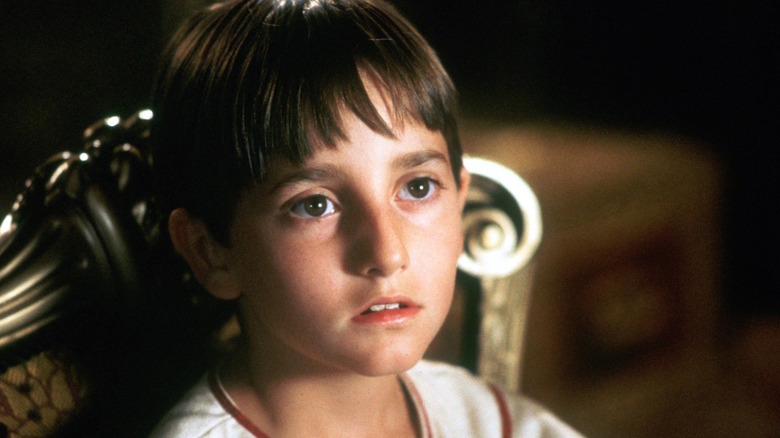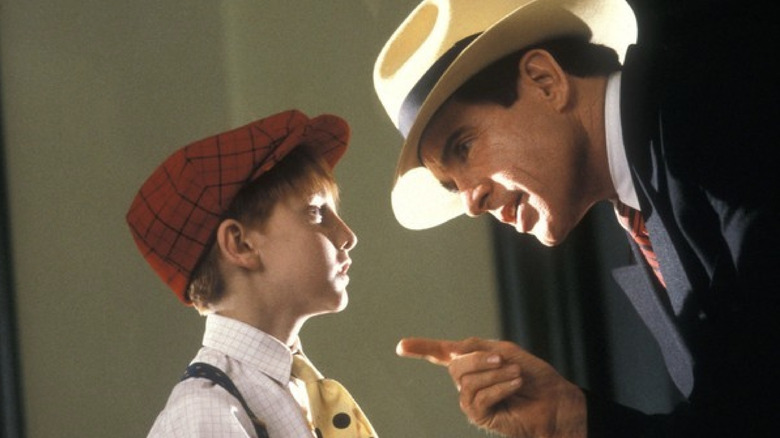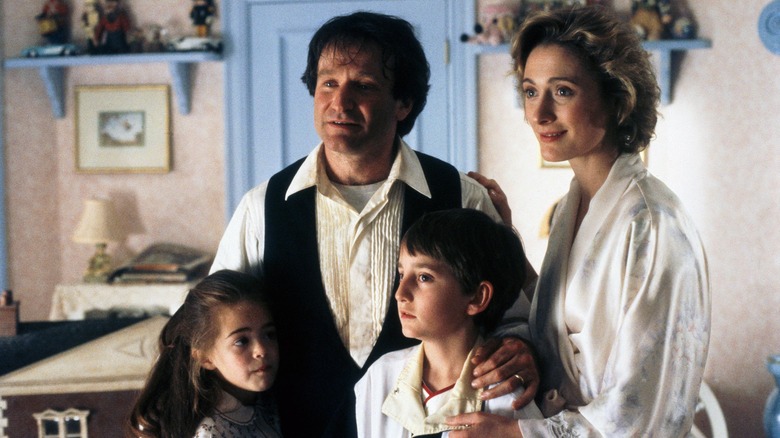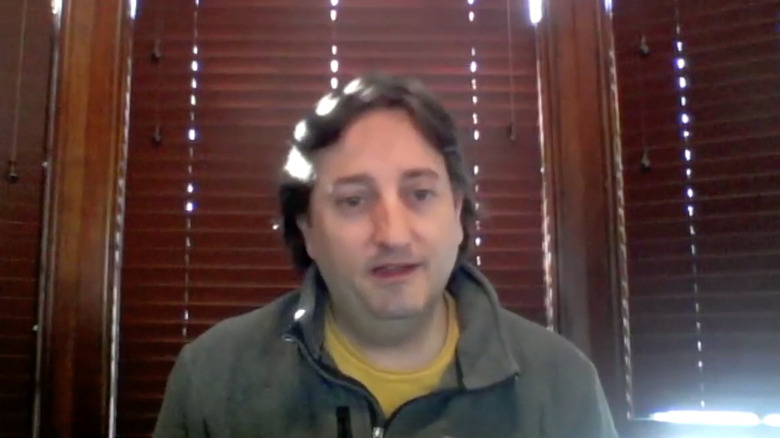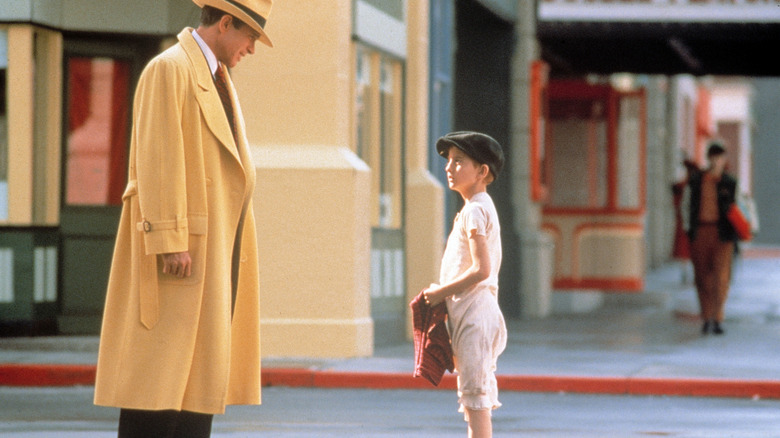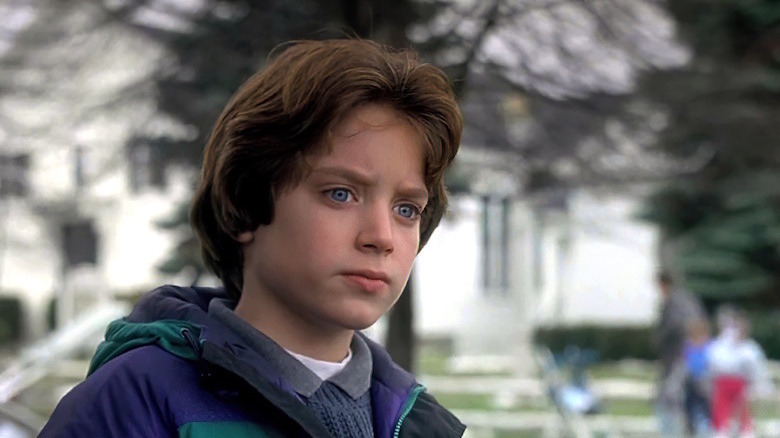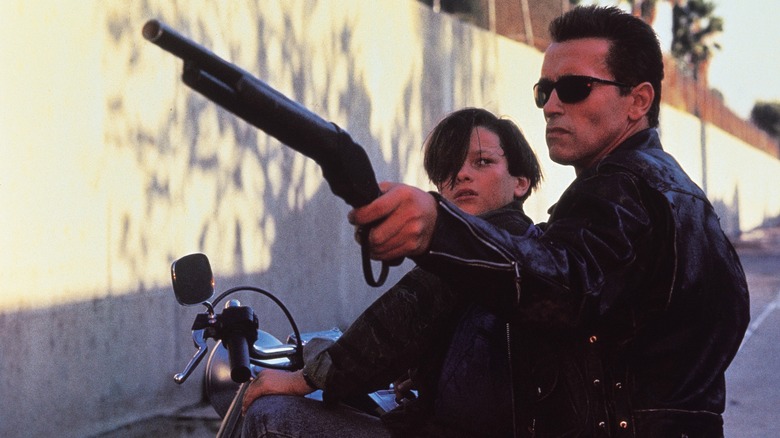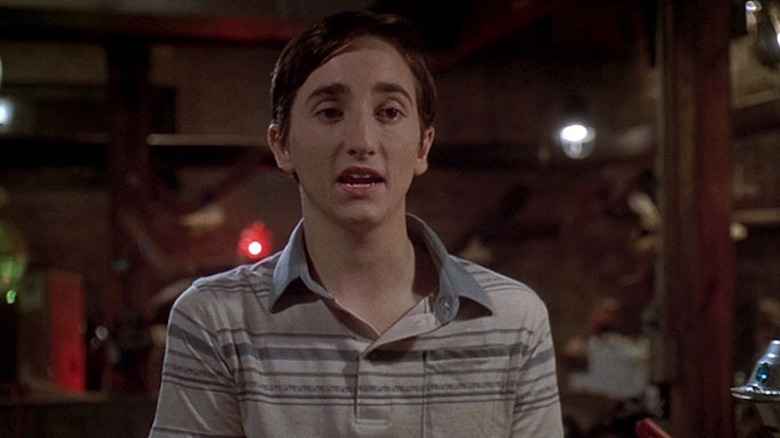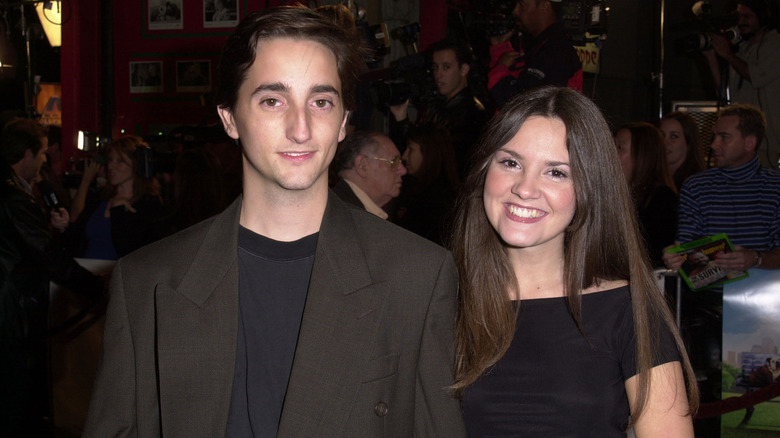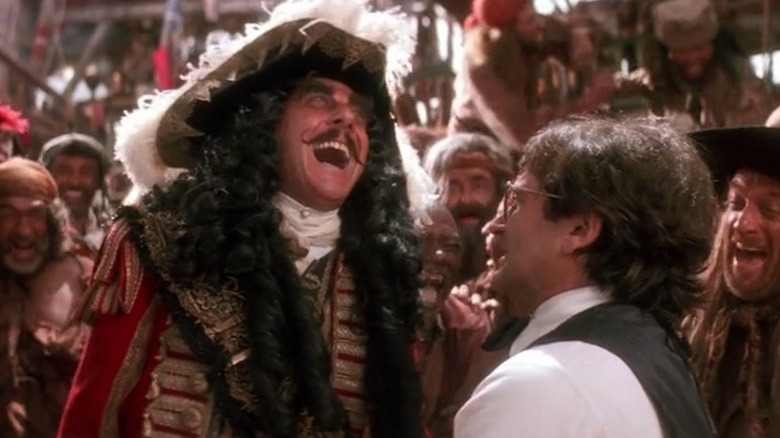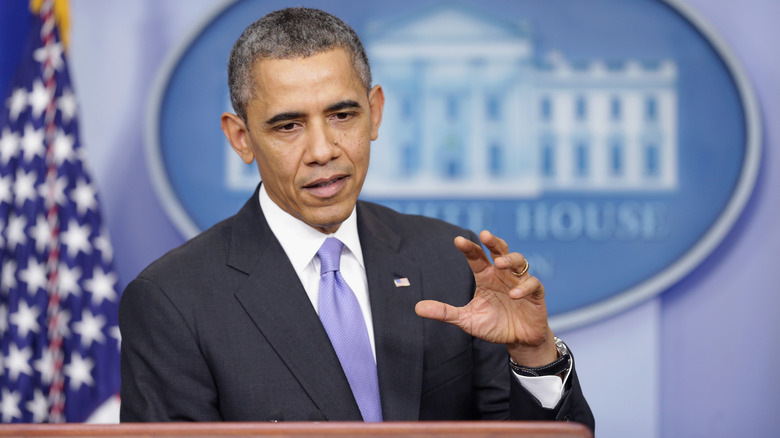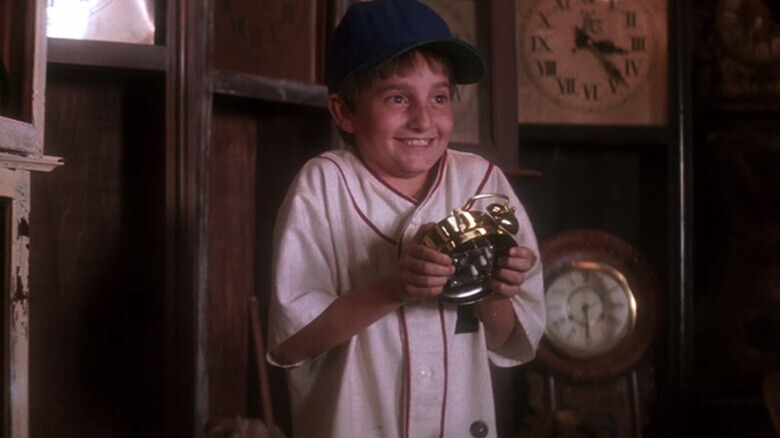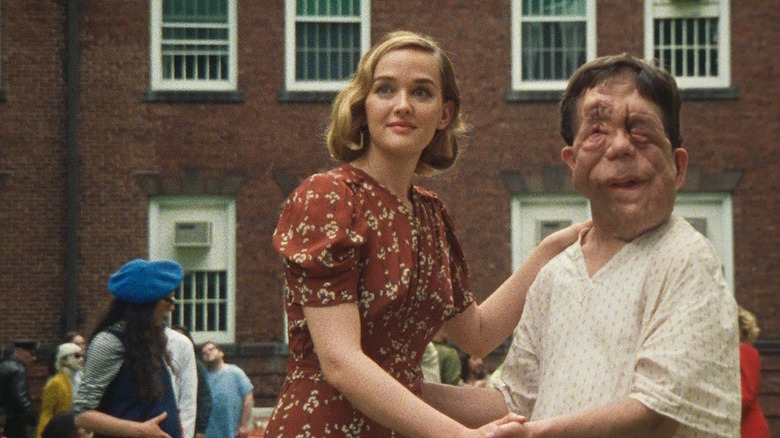Whatever Happened To Charlie Korsmo?
In the early 1990s, Charlie Korsmo was a young actor who seemingly everyone wanted to cast as part of their movie family. From a breakout performance in 1990's "Dick Tracy" as The Kid/Dick Tracy Jr. to his time as a member of the dysfunctional family belonging to Richard Dreyfuss in 1991's "What About Bob?" to perhaps his most notable role, playing the son of Peter Pan (Robin Williams) and ward of Captain Hook (Dustin Hoffman) in the 1991 Steven Spielberg blockbuster "Hook," Korsmo was quickly becoming Hollywood's go-to kid for star-packed hits.
Then, Korsmo unexpectedly vanished. While he's made some random reappearances in public in the years since, most of his life has unfolded far away from Hollywood cameras. The former child star has forged a unique life, filled with notable accomplishments since his time in the pictures. From multiple college degrees to a venerable teaching career, here's what has happened to Charlie Korsmo since — and why he stopped returning Hollywood's phone calls.
He turned his back on Hollywood
Why did Charlie Korsmo end his movie career so early? According to post-career interviews, he only got into acting so he could make enough money to buy a Nintendo.
"We went on a family trip to Los Angeles and saw a TV show being filmed — "Punky Brewster" — and I thought, this looks like something anyone can do," he recalled in a 2018 interview with People magazine. "It was mostly an excuse to get out of school."
After returning to his home in Minnesota, Korsmo's family helped him secure an agent by thumbing through the Yellow Pages for talent agencies. In short order, he was doing commercials.
"I went to dozens [of auditions]. It's a credit to my mother, who drove me to all these," he would recall in a 2023 interview with Sixth City Marketing Society. "Sitting at these stupid auditions. I didn't get any of them for 20, 25 auditions. Then I got a three-second one of me folding a flag. That was my first commercial."
Soon after, he was appearing in films like the 1990 Jessica Lange drama "Men Don't Leave." "No one saw the movie," he says, "but it was well received, so it opened doors to audition for other things, including 'Dick Tracy'."
"As I recall, I mostly wanted to get out of school and make enough money to buy a Nintendo," Korsmo told Case Western Review in 2021. "I never saw acting as a lifelong career ambition."
He put his movie paychecks to good use
After a couple years, with high school looming, Korsmo realized he didn't like spending so much time away from his family and friends, so he decided to retire. "After 'Hook,' that was my last movie as a kid, we really had a sort of choice to make," he told People. "I hadn't been in school for a few years. I suddenly found I didn't really have friends my own age anymore."
Ultimately, Korsmo enjoyed school and decided he wanted to pursue a higher education. This led him to put some of the money he'd earned from "Hook" and "Dick Tracy" toward funding these aspirations. "If I hadn't had the money I made from movies to pay for college," he would later tell the legal publication Chambers Associate, "I might have been forced to just go wherever I could get a football scholarship."
He ended up instead at prestigious M.I.T. (where he earned a degree in physics) and Yale (where he earned his law degree) — emerging from retirement in his teen years for only one film, which he today remembers as his most fun on-set experience: The 1998 Jennifer Love Hewitt/Seth Green cult classic "Can't Hardly Wait."
"I had the most fun doing 'Can't Hardly Wait'," he told Case Western Review. "It's more fun to make movies when you're 19 than when you're 10."
He's married now, and has two kids
As a child actor, Charlie Korsmo got to be part of several prominent (if somewhat dysfunctional) Hollywood movie families, with parents ranging from Jessica Lange (in "Men Don't Leave") to Robin Williams ("Hook") and Richard Dreyfuss ("What About Bob?"). Today, however, Korsmo's main role is that of father and husband.
"I went to law school, I met my now wife," he told YouTuber Sienna Boccio in 2021. "We decided to move to New York, I worked as a lawyer for a couple of years. Then, when we wanted to have kids, working as a lawyer at a big law firm is... well, if you've seen 'Hook' you know my father in 'Hook,' Robin Williams, is a corporate lawyer. That is an accurate depiction of what a corporate lawyer's life is. You never see your family, you're working 3000 hours a year. I really didn't want to do that."
"Now that I have a beautiful wife and [kids]," he told Chambers Associate, "it's hard to take other 'achievements' all that seriously."
"Academia [allows me to] have a lot more control over my schedule, and my kids actually know who I am," he told Boccio. "That's a good thing."
Today, as husband to Adrienne and father to Lilah and William, Korsmo's family generally stays out of the spotlight. But in his occasional interviews, Korsmo's pride is evident.
He got his handprints displayed in Hollywood
Before he quit acting, however, Korsmo had many once-in-a-lifetime opportunities.
Some actors, like Shirley Temple, have been afforded the honor of putting their handprints in the concrete courtyard of the famous Grauman's Chinese Theatre after just a few years in the business. Others, like Christopher Plummer, didn't get the honor until decades after beginning a career. Then there are actors like Charlie Korsmo, who never got the chance.
But that doesn't mean Korsmo didn't get to put his hands in some cement. In 1989, Walt Disney World launched "The Great Movie Ride," located at Disney's Hollywood Studios; it sent spectators through recreations of "The Wizard of Oz" (1939), "Singin' in the Rain" (1952), "Raiders of the Lost Ark" (1981), and other films. The ride itself was housed within a replica of Grauman's Chinese Theatre, complete with handprints of famous musicians and actors — including Korsmo.
Dated June 19, 1990, Korsmo's prints were cast for posterity in the wake of the release of his first major movie, "Dick Tracy." "The Great Movie Ride" was ultimately closed in 2017, however, and has since been replaced by "Mickey & Minnie's Runaway Railroad."
He inadvertently helped Elijah Woods' career
By 1992, Korsmo was considering his "retirement" from Hollywood — at the ripe age of 13 years old. But he had some considerable momentum at the time, so producers offered him a seven-figure deal to take on his most prominent role yet, starring opposite another child star — Macaulay Culkin, coming off the original "Home Alone" — who had become one of the most recognized young faces in filmdom. It was to come in a psychological thriller called "The Good Son," but ultimately, Korsmo would turn down the role, opting instead to return to school and life as a normal kid.
As a result, the filmmakers fell back on a different young actor; 11-year-old Elijah Wood, then a relative unknown most notable for being one of the kids in Paula Abdul's "Forever Your Girl" music video, was instead cast as the cousin of Culkin's preteen psychopath character.
Released in 1993, "The Good Son" was a long way from Kevin McCallister; it depicted a very bad Culkin causing vehicle pileups, putting his sister in a coma and then targeting his mother. Upon release, the film's subpar box-office was considered indicative of a career misstep for Culkin.
Although the film received poor reviews, at the time it represented the biggest acting showcase yet for Wood. Subsequent '90s titles like "The Ice Storm" and "Deep Impact" would continue to nurture his career along, and then in the early 2000s he would help front Peter Jackson's hugely successful "Lord of the Rings" trilogy. While there's no telling what would have happened to Korsmo (or Wood) if he had taken the role, it's an interesting "what if?" to consider.
He nearly starred in Terminator 2
Believe it or not, Korsmo also nearly played the Edward Furlong role in "Terminator 2," one of the most memorable (and profitable) blockbusters of the '90s. "I didn't want to do ['What About Bob?'] because I had been cast in 'Terminator 2," Korsmo told Sixth City Marketing Society. "I was supposed to be the kid in 'Terminator 2,' but my Minneapolis agent had signed a multi-picture contract with Disney after 'Dick Tracy,' and they pulled me to do 'What About Bob.' So, I missed out."
After Furlong played John Connor in that film, he went on to have a career marked by films good ("American History X"), bad ("Pet Sematary II"), and straight-to-video ("Attack on Darfur"); still acting today, it's intriguing to imagine how different Hollywood blockbusters might have become if "T2" had paired Arnold Schwarzenegger with Charlie Korsmo, rather than entering the zeitgeist as Furlong's high-profile acting debut and minting him as a household name.
He made his favorite movie after he stopped being a child actor
Korsmo spent the mid 1990s going to high school and starting college, but he did decide to return briefly to Hollywood to make "Can't Hardly Wait," a teen comedy that featured Ethan Embry as a high school outsider trying to proclaim his love for a popular girl (Hewitt) while avoiding her jock ex-boyfriend (Peter Facinelli). Korsmo was cast as a nerd, hoping to get revenge on Facinelli's character for bullying him throughout high school.
Behind the scenes, Korsmo admits he wasn't the filmmakers' first choice, but when original actor Adam Hann-Byrd (from 1995's "Jumanji") didn't work out, a door opened.
"I had called my old agent and said I'm willing to start doing auditions again," he recalled to Page Six in 2018. "[The casting was the result of] one of several audition tapes I just filmed with a college friend in my dorm room, sent it off and never heard anything. Then a few months later, they had already started filming and they called me and said, 'Can you be out here next week?' They had never met me when they cast me in the thing."
Korsmo says he still gets four or five $122 royalty checks coming in every few months from the high school flick. Nevertheless, Kosmo once again departed Hollywood. "I think I managed the trick of leaving voluntarily," he would later joke to Case Western University, "just about the time I would have been thrown out anyway."
He earned a degree in physics
Korsmo earned his first degree from the Massachusetts Institute of Technology in 2000, having majored in physics. This was achieved despite some occasional adversities — such as the time he had to convince his professors to let him take three weeks of a structural mechanics class by fax from Los Angeles as he filmed "Can't Hardly Wait."
"They're a bunch of Nobel Prize winners,'" Korsmo told the MIT campus magazine at the time. "They weren't awed by the movie stuff."
At the end of "Can't Hardly Wait," Korsmo's William Lichter is amusingly depicted as an enthusiast of endless academic pursuits, including the "Dead Romance Languages Club" and captain of the "State Physics Bowl Team." Korsmo recalled recently to Sixth City Marketing Society that while doing press for the movie, the erudite teen was accused of not acting particularly hard.
"They were like 'So, you were just playing yourself in this movie'," he explained. "I was in school for physics while we were filming the movie, so it was a natural question to ask. Yeah, obviously there were some similarities, but I had the advantage when I was in high school of having been a former child actor that William didn't. That spared me some of the social [ostracizing] I undoubtedly otherwise would have faced."
He worked to protect the environment — and its citizenry
Shortly after receiving his physics degree from M.I.T., Korsmo moved to Washington, DC in the hopes of finding a job that would allow him to capitalize on his interests in science and politics.
"I thought I would work for the Patent Office or something like that," he told AM Law Daily in 2009. "But instead I ended up working briefly for the House Science Committee and EPA."
The former child actor would spend three years in Washington, from 2000 to 2003. As his career evolved from science to policy, he began sending out applications to law schools — deferring his enrollment long enough to also take a position with the Homeland Security Committee.
Between his time with the Environmental Protection Agency (in its Office of Policy, Economics, and Innovation, helping to "create programs intended to promote innovative environmental technology"), the House Science Committee (working for the Republican Party in the House of Representatives as a staffer) and his time with Homeland Security (where he helped design and pass legislation for the development of new bioterrorism countermeasures), Korsmo found multiple applications for his talents. Some of his government work also involved working in missile defense with the U.S. government's Missile Defense Team.
Korsmo continues to have an interest in government, and isn't afraid to speak his mind. "I'll start with the tax code, in its totality," he responded to Chambers Associate when asked which law he'd most like to change, abolish or create. "[It's] a deliberate abomination; obstacle to human freedom and happiness."
He became a lawyer
When "Hook" arrived in theaters, 13-year-old Korsmo was playing the son of a corporate lawyer; little could anyone have realized that Korsmo would himself end up becoming a lawyer.
"Flexibility, more than anything," he would tell Chambers Associate years later when asked why he transitioned to a career in law. "Which has worked out nicely. That, and gouts of cash, which hasn't worked out as well."
From 2003 — 2006, Korsmo attended Yale Law School, joining the prestigious Federalist Society. After graduation with his Juris Doctor degree, he clerked in the U.S. Court of Appeals for the Second Circuit. He then went to work as a litigation associate for Sullivan & Cromwell, specializing in law involving real estate and shareholder derivative lawsuits. Looking at another path laid out before him — life in a large firm — he once again decided to throw a monkey wrench into the plan.
"I wanted something that would give me more flexibility to pursue other interests," Korsmo would later tell AM Law Daily. "That wouldn't have been possible at a large law firm, which can be an all-consuming profession."
Korsmo was accepted into the Brooklyn Law School's two-year visiting assistant professor program, designed to help lawyers transition into academia. He would subsequently become a professor of corporate law & finance at the Case Western Reserve University School of Law in Cleveland.
In 2014, the former actor told the ABA Journal that being a law professor is like "giving a live theatrical performance four times a week" while stating that answering student questions is like "improv theater."
He was honored by President Barack Obama
Charlie Korsmo's acting career may have been brief, but in the years he spent working in Hollywood, he got to rub shoulders with some of Hollywood's biggest names — from Warren Beatty to Dustin Hoffman to Steven Spielberg. While filming "Dick Tracy," Korsmo recalls that whenever Beatty was late coming to set, he would be the one dispatched to get him, because others were intimidated by the actor/director. Later, Korsmo developed a friendly relationship with Spielberg while making "Hook," and he still exchanges Christmas cards with the Academy Award winning director.
Outside of movie sets, Korsmo has also interacted with some big names. In May 2011, then-President Barack Obama nominated Korsmo to be a member of the Board of Trustees of the Barry Goldwater Scholarship and Excellence Foundation. The foundation awards prestigious scholarships to support college students pursuing careers in natural sciences, math, and engineering.
He continues to sign his merchandise
Although he thinks most of his law students are too young to remember him in any 1990s movies except perhaps "Can't Hardly Wait," Charlie Korsmo told Case Western in 2021 that he still get an "unusual volume" of fan mail, asking him to sign things like "Dick Tracy" and "Hook" trading cards. The mail often includes heartwarming notes about how much it would mean to have his autograph, which motivates Korsmo to oblige.
However, Korsmo has also noticed that much of this signed movie memorabilia ends up on eBay, making him wonder if those autograph requests were motivated more by profit than nostalgia. Nevertheless, he maintains a sense of humor about the whole thing. In that same interview, he noted that the going rate for his trading cards seems to be around ten dollars, so he was considering flooding the market by signing more memorabilia and offering it for only eight dollars.
Korsmo also said that as the years have gone by, fewer people recognize him on the street. "It happens less often than it used to," he told Case Western. "But I can't tell whether that's because fewer people remember, or because I never go anywhere now that I have two kids."
He returned to acting a second time to make a critically acclaimed movie
Turning 44 years old in 2023, Korsmo is settled into his life as a law professor and family man — but that doesn't mean the acting bug has completely abandoned him. In 2019, he appeared in his first film in 20 years, a drama entitled "Chained for Life" (2019). Written and directed by Brooklyn indie filmmaker Aaron Schimberg, the film functions as a meta-commentary on how beauty is portrayed in movies, and was described by distributor Kino Lorber as "Tod Browning crossed with Robert Altman crossed with David Lynch."
Korsmo plays "Herr Director," an autocratic German director who might not really be German and may have been raised in a circus. The movie Herr Director is making, "God's Mistakes," is a pretentious story about a mad scientist and his evil nurse sidekick operating on disabled patients. To add to his fictional movie's authenticity, Herr Director casts people with actual physical disfigurements, including Rosenthal (Adam Pearson, "Under the Skin"), a man with neurofibromatosis. Much of the plot involves seeing how Rosenthal connects with his beautiful co-star Mabel (Jess Weixler from "Teeth") who plays a blind woman in the movie.
"Chained for Life" received favorable reviews from critics, including Roger Ebert.com writer Sheila O'Malley. "There's a free-floating, absurdist mood established, humorous and self-referential," she wrote, "allowing space for the audience to not just feel, but think."
